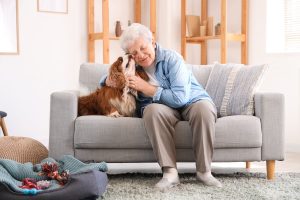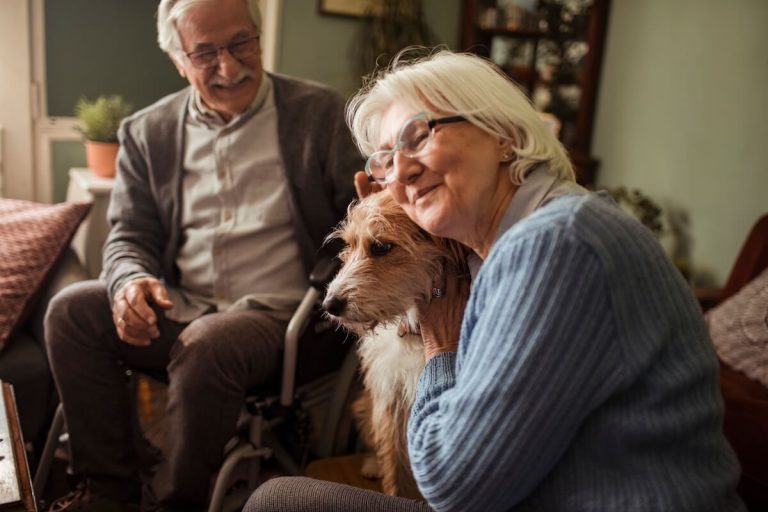Pets have always been a source of joy and companionship, but for older adults, they can be life-changing. Whether through the devoted duties of a service dog or the affectionate presence of a companion pet, the health benefits of animal interactions can profoundly improve physical and mental well-being. Beyond providing comfort and connection, pets also foster independence, reduce isolation, and contribute to healthier practices.
Our team at The Pavilion at Great Hills explores how service dogs and companion pets can brighten the lives of older adults and how to choose the right furry companion. In our senior living community in Austin, TX, we encourage pet ownership and gentle animal interactions that can enrich residents’ daily ventures.
Service Dogs vs Emotional Support Pets

At its core, a service dog is a highly trained animal distinguished by its ability to perform specific tasks for individuals with physical or mental impairments. Legally, service dogs are protected under the Americans with Disabilities Act (ADA) and are granted access to public spaces closed to other pets. However, not all dogs fall into this category.
Service dogs differ significantly from therapy dogs and emotional support pets. Therapy dogs provide comfort in group settings, such as hospitals or schools, while emotional support pets offer necessary companionship but lack the training to perform specific tasks.
The Health Benefits of Animal Interactions
- Boosts physical health: Spending time with pets has been shown to lower blood pressure, reduce the risk of heart disease, and encourage light physical activity, such as walking or playing. Over time, this can lead to improved fitness and overall health.
- Reduces isolation: Pets are great companions and can help combat feelings of loneliness. They encourage connection by sparking social interactions with others, whether it’s through a walk in the park or conversations with fellow pet owners, fostering a stronger sense of community.
- Improves mental well-being: Animals provide unconditional love and emotional support, which can help reduce stress, anxiety, and depression. The joy and comfort they bring into daily life can have a lasting positive impact on mental health.
- Encourages healthy routines: Caring for pets helps older adults establish structured daily routines, from feeding schedules to walks. These routines keep them active, engaged, and focused, contributing to a healthier and more balanced lifestyle.
Service Dogs and Their Impact on Disabilities or Dementia
Service dogs are truly invaluable for older adults living with disabilities or cognitive conditions such as Alzheimer’s disease. These dedicated animals help individuals maintain daily functionality and emotional stability despite unique challenges.
For individuals with physical disabilities, such as arthritis or limited mobility, service dogs help prevent further strain by assisting with tasks like pushing wheelchairs or adjusting positions. Their support alleviates some of the physical difficulties that often accompany aging.
For those living with the confusion or anxiety linked to dementia, service dogs provide a calming presence. They help ground individuals during moments of disorientation, reduce stress levels, and maintain consistent routines that bring comfort and predictability.
Finding the Right Pet
Choosing between an emotional support pet or a service dog is a deeply personal decision that depends on your unique lifestyle, preferences, and needs. While service dogs are trained to perform specific tasks to assist with disabilities, emotional support animals provide companionship, love, and comfort without requiring special training.
Consider factors such as your activity level, living space, and care capabilities. Cats are a great option for low-maintenance companionship because they are independent and require minimal outdoor time. Dogs can be excellent companions for those looking for a more interactive bond. Smaller breeds, for instance, often suit individuals with limited living space or mobility.
Matching an animal’s temperament, energy level, and care needs to your daily routine is key. For instance, an older adult with limited mobility might benefit from a calm, well-trained service dog or a low-energy pet, while an active individual might prefer a playful dog breed.
Celebrate the Joy of Animal Companionship

From lending a helping paw to warming hearts, service dogs and companion pets uniquely elevate the lives of older adults. These remarkable animals foster physical health, emotional stability, and a shared sense of connection that brightens each day.
At The Pavilion at Great Hills, we celebrate and encourage these connections through Creature Comforts, one of our signature Valeo™ programs. Designed to enrich the lives of residents with dementia, this program incorporates animal interactions to promote emotional well-being, reduce stress, and enhance daily joy for residents.
If you or a parent are exploring pet ownership, consider how the health benefits of animal interactions could transform life for the better. For further assistance or to learn more about our vibrant senior living community in Austin, TX, don’t hesitate to contact a member of our team.









